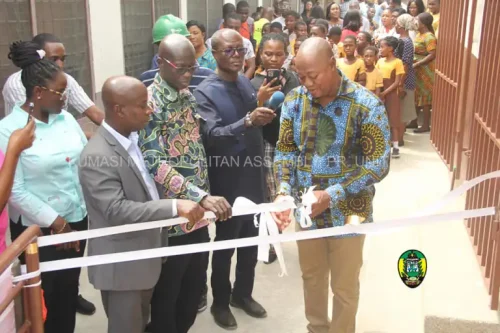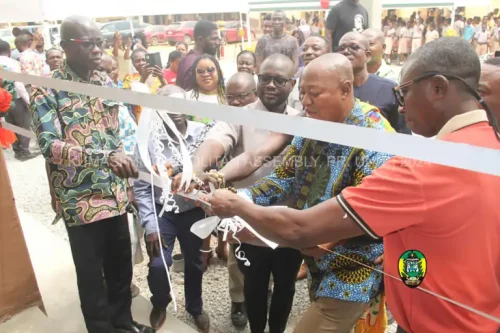Three schools in three communities within the Kumasi Metropolitan Assembly (KMA) now have two restrooms and a six-unit classroom block under construction.
The towns of Adumanu, Buokrom, and Amakom are the beneficiaries.
The Higher Institute of Islamic School in Buokruom and Obiri Yeboah M/A Primary and Junior High in Amakom both had nine-seater modern restrooms, while Adumanu benefited from a six-unit classroom furnished with furniture.
The Responsiveness Factor Grant (RFG) and the District Assemblies Common Fund (DACF) provided funding for the three projects.

During the handover ceremony, Sam Pyne, the Chief Executive Officer of KMA, urged the beneficiary communities to properly maintain and care for the facilities in order to extend their lifespan.
According to him, the facilities’ main purposes were to guarantee kids’ continuous access to school and to assist kids’ education in the city.
He said that the restrooms, which included water facilities, had been designed with disabilities in mind to make them easily accessible to students who have trouble moving around.
“The KMA, under the Local Government Ministry, is committed to investing resources into making education accessible so that we can get optimum outcomes, and we urge all stakeholders, including school authorities, to do their best in ensuring that projects and infrastructure provided for schools are maintained at all times to serve their purpose,” he said.

Francis Assenso-Boakye, the Bantama Member of Parliament, for his part, expressed his gratitude to the KMA for finishing the Adumanu M/A school project, which he claimed was a personal favorite.
He expressed his gratitude to Nana Kwame Frimpong Akowuah III, the community chief, for demonstrating a special interest in the project.
In addition, Nana Akowuah III praised the KMA for finishing the first phase of the basic school’s one-story building and prayed that the second phase would start soon to give the locals access to additional school infrastructure.
In order to deter trespassers during school hours and stop squatters from using the classrooms for illicit purposes, he advocated for the construction of a fence wall surrounding the school.
Source: Ghanatodayonline.com
 Ghanatodayonline.com News, Politics, Health, Education & More
Ghanatodayonline.com News, Politics, Health, Education & More




